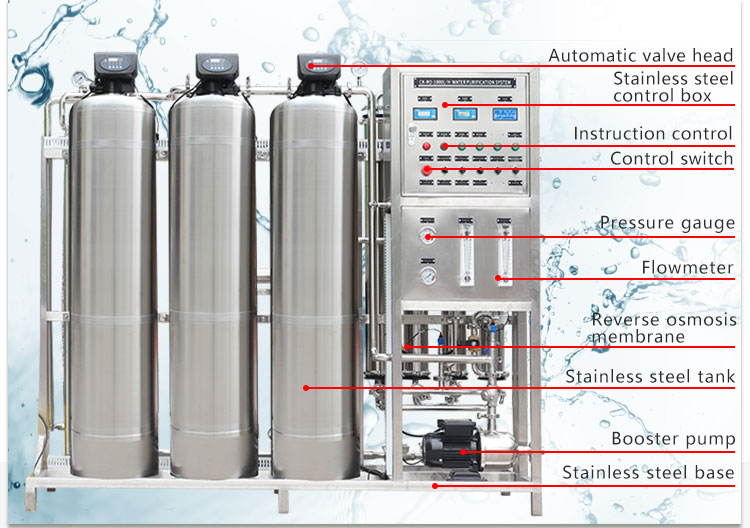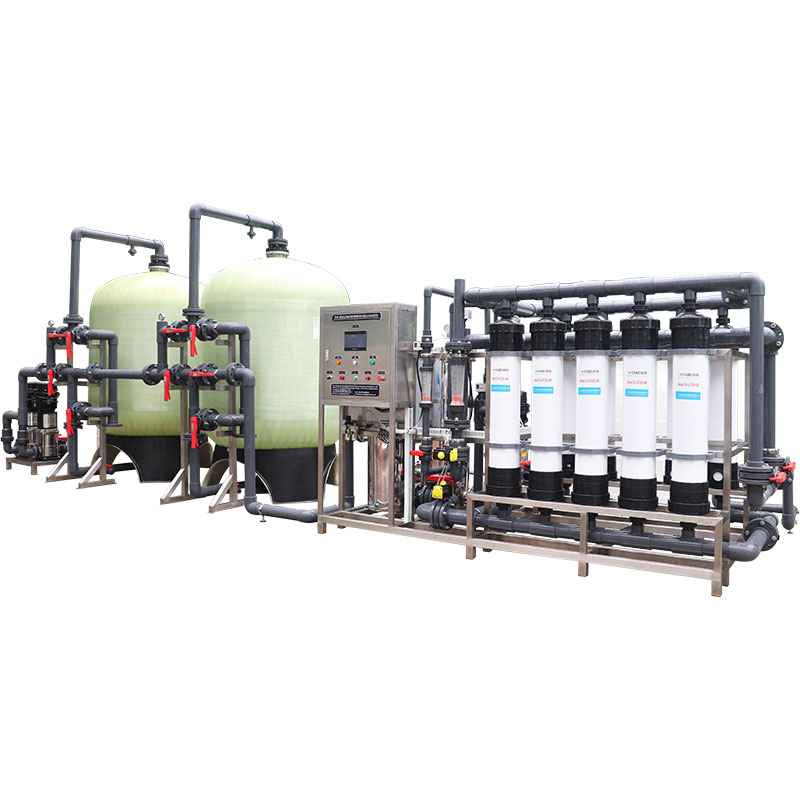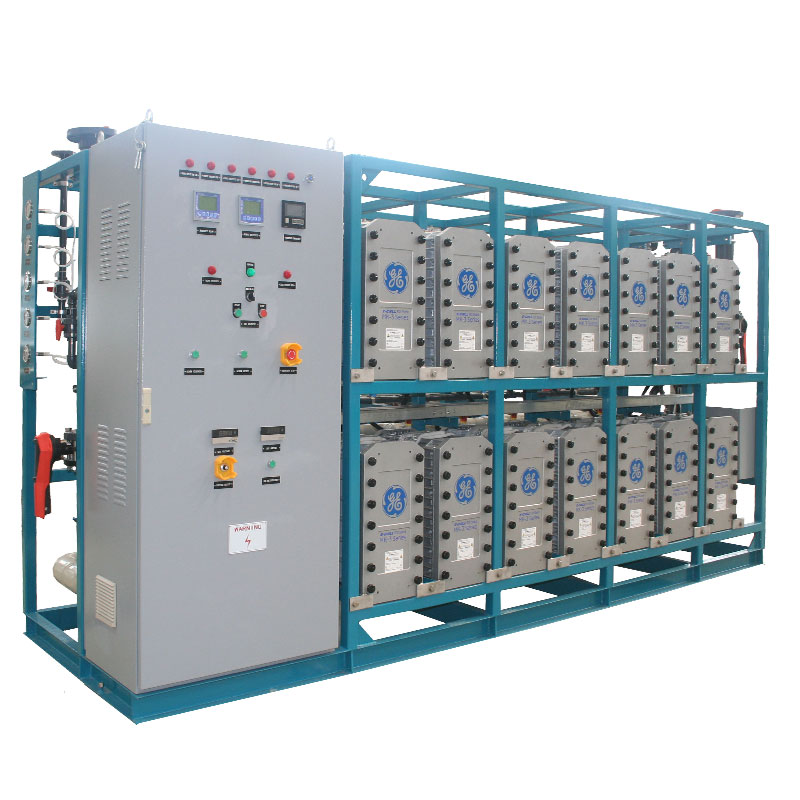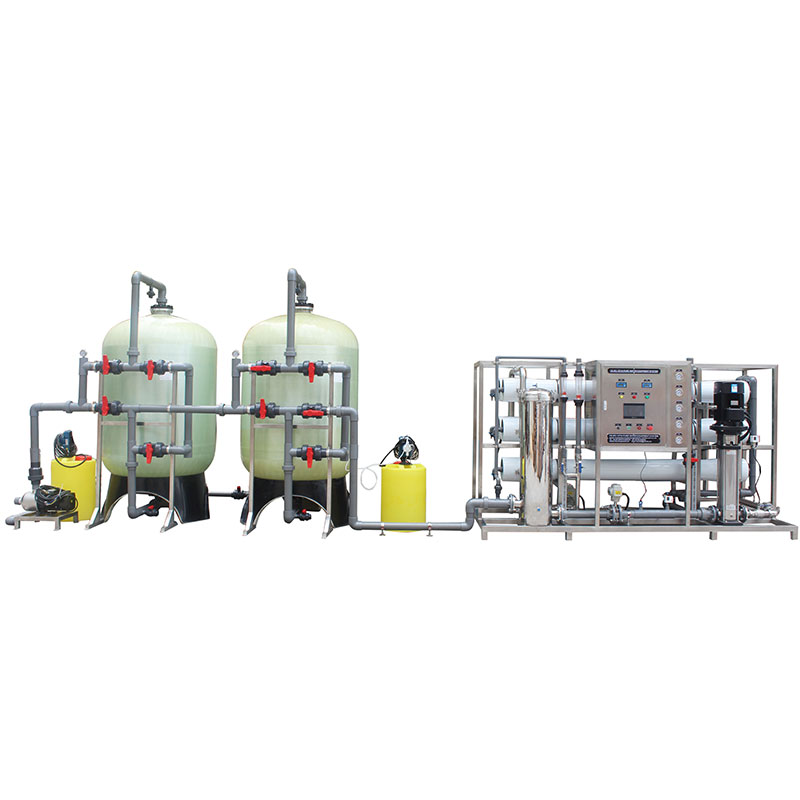What types of water filtration machines are there?
A water filter is a device that improves water quality by removing impurities, suspended matter, and pollutants from water. As people's demand for healthy drinking water increases, water filters have become important equipment in the home, industrial, and commercial fields.
However, there are many types of water filters, and their working principles and application scenarios are also different. This article will explore the main types of water filters and their different application areas in detail to help readers better understand the functions and applicability of these devices.

What types of water filters are there?
Main types of water filters:
1. Mechanical filter
2. Activated carbon filter
3. Reverse osmosis filter
4. Ultraviolet filter
5. Ultrafiltration filter
6. Ceramic filter
7. Water softener
8. Electrolyzer
1. Mechanical filter
Mechanical filters are the most basic type of water filters, removing large suspended matter and impurities from water through physical barriers. Mechanical filters usually use a filter screen or filter cloth, and when water flows through, particles are intercepted and clean water flows out. The pore size of this filter can be adjusted according to demand. Common methods include coarse filtration and fine filtration.
● Application areas: Mechanical filters are widely used in industrial, agricultural and municipal water treatment, and are suitable for removing larger particles and sediments. The pre-filter in the home is also a mechanical filter, which is used to preliminarily purify tap water.
2. Activated carbon filter
Activated carbon filter uses the strong adsorption of activated carbon to remove organic matter, residual chlorine, odor and some heavy metals in water. Activated carbon filters are usually granular or block activated carbon. When water flows through, pollutants are adsorbed on the surface of activated carbon, thereby achieving the purpose of purifying water quality.
● Application areas: Activated carbon filters are widely used in household water purifiers, portable water purification equipment and drinking water treatment systems, and are particularly suitable for removing odor, residual chlorine and organic pollutants in water. In addition, activated carbon filters are also used in industrial and commercial fields to treat process water and wastewater.
3. Reverse osmosis filter
Reverse osmosis filter is a high-efficiency filtration device that removes dissolved salts and small molecular organic matter in water through a semi-permeable membrane. The pore size of the reverse osmosis membrane is very small, which can remove most soluble pollutants, such as heavy metals, bacteria, viruses and dissolved salts.
● Application areas: Reverse osmosis filters are widely used in household drinking water purification, high-end commercial water purification systems, seawater desalination and laboratory pure water preparation. Its high efficiency of filtration makes it an important tool for treating seriously polluted water sources and providing high-purity water.
4. UV filter
The UV filter uses UV lamps to emit ultraviolet rays of a specific wavelength to inactivate bacteria, viruses and other microorganisms in the water. Ultraviolet rays do not change the chemical composition of water, but only destroy the DNA of microorganisms and make them lose their reproductive ability, thereby achieving the purpose of disinfection.
● Application areas: UV filters are mainly used in occasions that require high-standard water quality, such as household drinking water systems, industrial water treatment, swimming pool disinfection and hospital water. This filter is often used in combination with other types of filters to ensure comprehensive purification of water quality.
5. Ultrafiltration filter
Ultrafiltration filters use the tiny pore size of the ultrafiltration membrane to push water through the membrane by pressure, thereby intercepting suspended matter, colloids, bacteria and some viruses in the water. The pore size of ultrafiltration membranes is usually between 0.01 and 0.1 microns, which can effectively remove tiny particles and some harmful substances.
● Application areas: Ultrafiltration filters are widely used in home water purifiers, food processing, pharmaceutical manufacturing, and laboratory water preparation. It effectively removes harmful microorganisms while retaining beneficial minerals in water, and is an excellent filtration device.

6. Ceramic filter
Ceramic filter uses porous ceramic material as the filter medium to remove suspended matter, bacteria and other tiny particles in the water by physical interception. Ceramic filters are durable, washable and reusable, with high filtration accuracy.
● Application areas: Ceramic filters are often used in home portable water purifiers, emergency water purification equipment and some low-cost water purification solutions. Because it does not require electricity and chemicals, ceramic filters are also very popular in remote areas and outdoor activities.
7. Water softener
Water softener removes calcium and magnesium ions from water through ion exchange resin, thereby reducing the hardness of water. Calcium and magnesium ions in hard water easily form scale in pipes and equipment. The role of water softeners is to avoid this phenomenon, extend the life of equipment and improve water comfort.
● Application areas: Water softeners are mainly used in home and industrial occasions, especially in hard water areas, where water softeners are essential equipment. It can protect home appliances, boilers and industrial equipment from scale and is widely used in laundry, bathing, hot water supply and industrial water systems.
8. Electrolyzers
Electrolyzers decompose tap water into acidic water and alkaline water through the electrolysis process. Alkaline water is believed to help neutralize acidic substances in the body, so it is often used as healthy drinking water; acidic water can be used for disinfection and cleaning.
● Application areas: Electrolyzers are mainly used in home drinking water systems, and are especially favored by consumers who pay attention to healthy drinking water. In the commercial field, some restaurants and beauty salons also use electrolyzers to provide specific water quality to meet customer needs.

Analysis of application areas of different types of water filters
Although the above water filters can purify water quality, different types of filters have different applicability in specific application areas. This difference mainly depends on the pollution of the water source, the purpose of filtration and the requirements of water quality standards.
1. Household water purification
The main goal of household water purification is to ensure the safety and health of drinking water. Since most household water comes from municipal tap water, this water source has usually been treated to a certain extent, but in order to further improve the water quality, household filtration equipment usually needs to combine multiple filtration technologies.
● Preferred equipment: reverse osmosis filter, activated carbon filter, ultrafiltration filter.
● Application characteristics: These devices can effectively remove residual chlorine, heavy metals, microorganisms and dissolved organic matter to ensure the purity and safety of household drinking water.
2. Industrial water treatment
Industrial water treatment is more complex because of the diversity of industries and process flows involved, and the required water quality standards vary from process to process. For example, the electronics manufacturing industry requires ultrapure water of extremely high purity, while food processing requires treated water to remove specific pollutants.
● Preferred equipment: reverse osmosis filter, ultrafiltration filter, water softener, mechanical filter.
● Application characteristics: Industrial filters usually need to process large amounts of water and need to ensure stable water quality, so the durability and processing capacity of the equipment are key considerations.
3. Agricultural and irrigation water
The main needs of agricultural and irrigation water are to remove suspended particles in the water and prevent irrigation systems from clogging. Since agricultural water consumption is large and water quality requirements are relatively low, the design focus of the filter is to efficiently process large flows of water and reduce maintenance costs.
● Preferred equipment: mechanical filters, ultrafiltration filters, water softeners.
● Application characteristics: These filters can effectively remove large particles, protect irrigation equipment, and ensure the normal growth of crops.
4. Municipal and commercial water
Municipal and commercial water treatment mainly involves the purification of large-scale water sources to meet public health and drinking water standards. Due to the large usage and high water quality requirements, municipal and commercial water treatment usually uses multi-stage filtration systems.
● Preferred equipment: reverse osmosis filters, activated carbon filters, mechanical filters, ultraviolet filters.
● Application characteristics: These devices are used in combination to ensure that municipal water supply systems and commercial water systems provide safe and clean water quality, suitable for various drinking and industrial purposes.
5. Special application scenarios
Some specific scenarios such as laboratories, high-end restaurants, medical institutions, etc. have extremely high requirements for water quality and usually require the use of specially designed filtration systems.
● Preferred equipment: reverse osmosis filter, electrolyzer, ultrafiltration filter.
● Application characteristics: In these application scenarios, water filtration equipment must not only provide high-purity water, but also have stability and reliability to meet the needs of special environments.

Conclusion
There are various types of water filters, each of which has its own unique working principle and applicable field. According to different application requirements, it is crucial to choose the right filtration equipment to ensure that the water quality meets the standards and achieve economic benefits. Whether in the home, industry, agriculture or commercial fields, the reasonable combination and application of these equipment can achieve the best water treatment effect.




